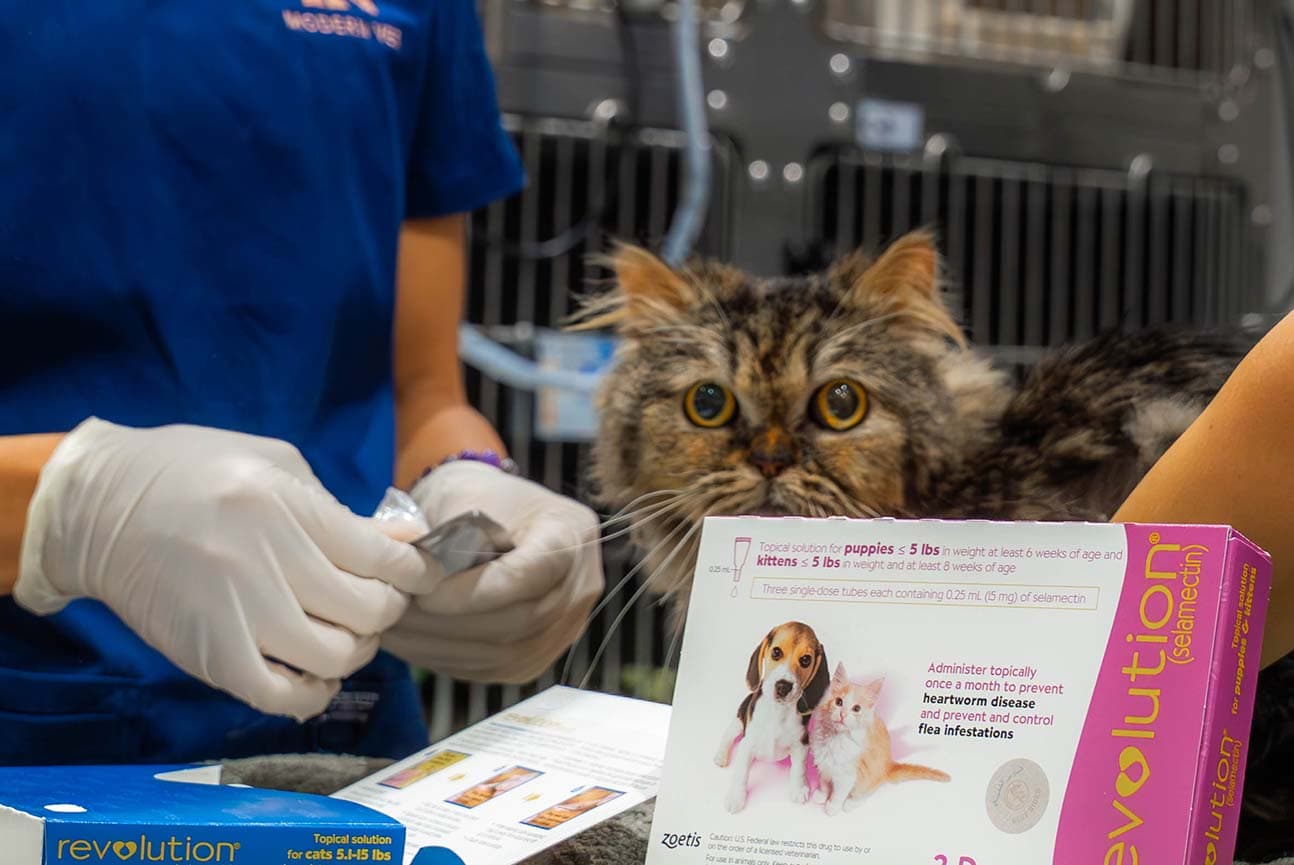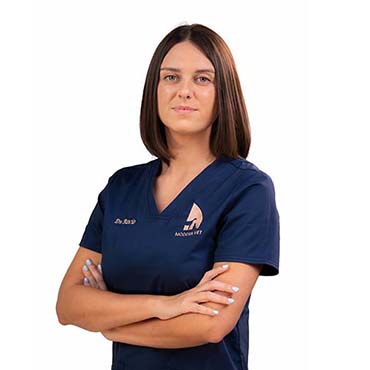Reviewed by Dr. Rocio Mena
Updated on 16/09/2025
Reading time 4 min.
Overview
Severity: Low
Life stage: All
Gastroenteritis is one of the most common digestive issues affecting cats in Dubai and the UAE. Gastroenteritis symptoms, vomiting and diarrhoea, can be worrying for pet owners. While many cases clear up with a simple change in diet, severe episodes can quickly become a veterinary emergency. Dangerous dehydration is a rapidly developing and life-threatening risk in Dubai’s extreme heat. Understanding gastroenteritis, when and how to manage symptoms at home and when to seek professional help can make all the difference to your cat’s safe recovery and wellbeing.
What is Gastroenteritis in Cats?
Gastroenteritis means inflammation of the stomach and intestines. Gastroenteritis can affect cats of any age, with causes ranging from heat stress to dietary changes. The digestive system relies on healthy cells and beneficial bacteria working together. When this balance is disrupted, whatever the cause, the body responds by trying to expel the irritant, causing the typical symptoms of vomiting and diarrhoea.
Common causes include:
- Stress from household changes or a bustling environment
- Sudden changes in diet, trying new imported pet foods, raiding bins
- Infections: viruses, bacteria, protozoa (Giardia, Tritrichomonas)
- Parasites: worms
- Toxic plants: common in Dubai landscaping
- Rich or fatty meals, including human foods, that are difficult to digest
- Chemical irritants or substances
- Having other illnesses: liver or kidney disease, hyperthyroidism
- Food intolerances or allergies
Dubai’s environmental factors
- Heat stress: Dubai’s soaring temperatures can affect cats’ digestive systems, particularly cats who roam outdoors during the summer months, when temperatures exceed 45°C
- Air conditioning changes: Moving between variably air-conditioned indoor spaces and into outdoor heat can put stress on your cat’s body
- Exposure to sand and dust: Dubai’s sandy environment means cats ingest sand irritants during grooming
Recognising the Symptoms
Gastroenteritis symptoms can range from mild to severe. In Dubai’s hot climate, it’s essential to monitor these signs carefully as dehydration develops quickly and requires prompt veterinary attention.
Common symptoms include:
- Vomiting: bile, food, even blood
- Diarrhoea: soft stools to liquid consistency
- Frequent trips to the litter tray or house soiling
- Blood in the stool
- Abdominal pain: behavioural changes, such as aggression or hiding away
- Not eating or drinking: particularly concerning in hot weather
- Lethargy or sleeping more
- Excessive drooling
Dubai-specific concerns:
- Rapid dehydration due to heat and humidity
- Increased lethargy during peak summer temperatures
- Reduced water intake despite increased need
Cats at Higher Risk
Whilst gastroenteritis can affect any cat, certain factors increase the risk, particularly in Dubai.
Higher risk groups:
- Young kittens and senior cats with weaker immune systems
- Outdoor cats exposed to Dubai’s harsh environment: temperature extremes mean cats in Dubai are safer indoors
- Indoor cats experiencing stress from confined living, bullying, or household changes
- Cats with pre-existing digestive problems
Dubai environment and lifestyle risk factors:
- Recently relocated cats still adjusting to Dubai’s climate and possibly to new confinement indoors
- Cats with limited balcony access, where abundant houseplants or cleaning products may be present
- Indoor cats with dietary boredom leading to scavenging behaviours
How vets diagnose gastroenteritis
For mild cases that respond to symptom management, identifying the exact cause isn’t always necessary. However, for severe or persistent cases, your vet may advise further tests.
Diagnostic tests:
- Blood tests to assess hydration, organ function, and signs of infection
- Faecal (poo) analysis for parasites and bacterial infections
- Imaging: X-rays and ultrasound to rule out foreign bodies and check the intestinal structure
- Advanced tests: specific blood tests, biopsies or exploratory surgery for complex cases
Your vet will consider your cat’s history, symptoms, and response to initial treatment when deciding which tests are needed.
Veterinary treatment for gastroenteritis in cats
If symptoms are severe or your cat shows signs of dehydration, immediate veterinary care is essential.
Treatment options include:
- Emergency fluid therapy: Fluids given directly into your cat’s veins for rapid rehydration
- Anti-nausea and anti-vomiting medications
- Gastric protectants to reduce stomach irritation
- Pain relief when necessary
- Targeted antibiotics for confirmed bacterial infections
- Helping your cat’s body keep a safe, stable temperature when the weather is very hot during extreme weather
Looking after a cat with gastroenteritis at home
For very mild cases, or once your vet has assessed your cat, supportive home treatment strategies can help with recovery.
Immediate care:
- Provide a cool, comfortable environment away from Dubai’s heat
- Allow the stomach to rest for 4-12 hours (depending on your cat’s age and body condition)
- Encourage small, frequent water drinks of water to prevent dehydration
- Ensure easy access to fresh, cool purified or bottled water throughout the day
Dietary management:
- Offer small, frequent meals using easily digestible foods.
- Plain cooked chicken or white fish works well for most cats.
- Feed up to half of the normal amount for the first 24 hours and build up gradually as symptoms improve.
- Consider prescription diets that offer balanced nutrition and speed up recovery.
- Gradually reintroduce a normal diet over 3-5 days.
Supportive care:
- Anti-diarrhoea pastes: contain absorbent minerals, such as kaolin or montmorillonite, which help to firm up stools and ease symptoms
- Probiotics to restore healthy gut bacteria
- Keeping your cat in air-conditioned rooms during recovery
- Monitor closely for signs of worsening or new symptoms
Prevention of gastroenteritis
Reducing the risk of gastroenteritis requires attention to both general health and climate-specific factors:
General prevention:
- Feed your cat a complete, high-quality diet
- Maintain them at a healthy weight and body condition
- Keep vaccinations up-to-date: cats living exclusively indoors are still at risk
- Use regular parasite preventives: appropriate to your cat’s age and lifestyle
- Limit hunting opportunities and outdoor exposure during extreme weather
Dubai-specific prevention:
- Make the change to climate-appropriate feeding schedules gradually
- Ensure constant access to fresh, cool and purified water
- Remove toxic plants commonly used in Dubai landscaping
- Keep indoor temperatures steady at 22-24 °C
- Be cautious with imported treats or foods that may not suit local conditions
Community health:
- Viral gastroenteritis spreads easily between cats, so isolate affected cats
- Clean litter trays promptly: essential in Dubai’s heat, where bacteria multiply rapidly
- Avoid contact with unfamiliar cats during illness and for two weeks after recovery
When to Seek Emergency Care
Dubai’s climate makes certain symptoms more urgent. Contact your veterinarian immediately if your cat shows:
Emergency signs:
- Significant blood in diarrhoea
- Black, tarry stools
- Persistent vomiting
- Weakness or unresponsiveness
- Signs of severe dehydration, which are particularly dangerous in Dubai’s heat
Seek prompt veterinary attention for:
- Continued vomiting, despite resting the stomach
- Constant watery diarrhoea
- Complete loss of appetite during hot weather
- Unusual lethargy or changes in behaviour
- Any blood in stool or vomit
Is your cat showing signs of vomiting or diarrhoea? Don’t wait! Digestive issues can escalate quickly in Dubai’s heat. At Modern Vet Hospital, our experienced veterinary team understands how gastroenteritis affects cats in our unique climate. We offer comprehensive diagnostic testing, immediate treatment for dehydration, and personalised recovery plans to get your feline friend back to their playful self. Whether it’s a mild upset tummy or something more serious, we’re here to help. Book your appointment today and give your cat the expert care they deserve.
Share this, choose your platform!
Reviewed by
Dr. Rocio Mena
DVM
Dr. Rocio Mena was born in Spain and discovered her passion for veterinary medicine early in life. She pursued this dream and graduated from CEU University in Spain in 2018 with a degree in…


